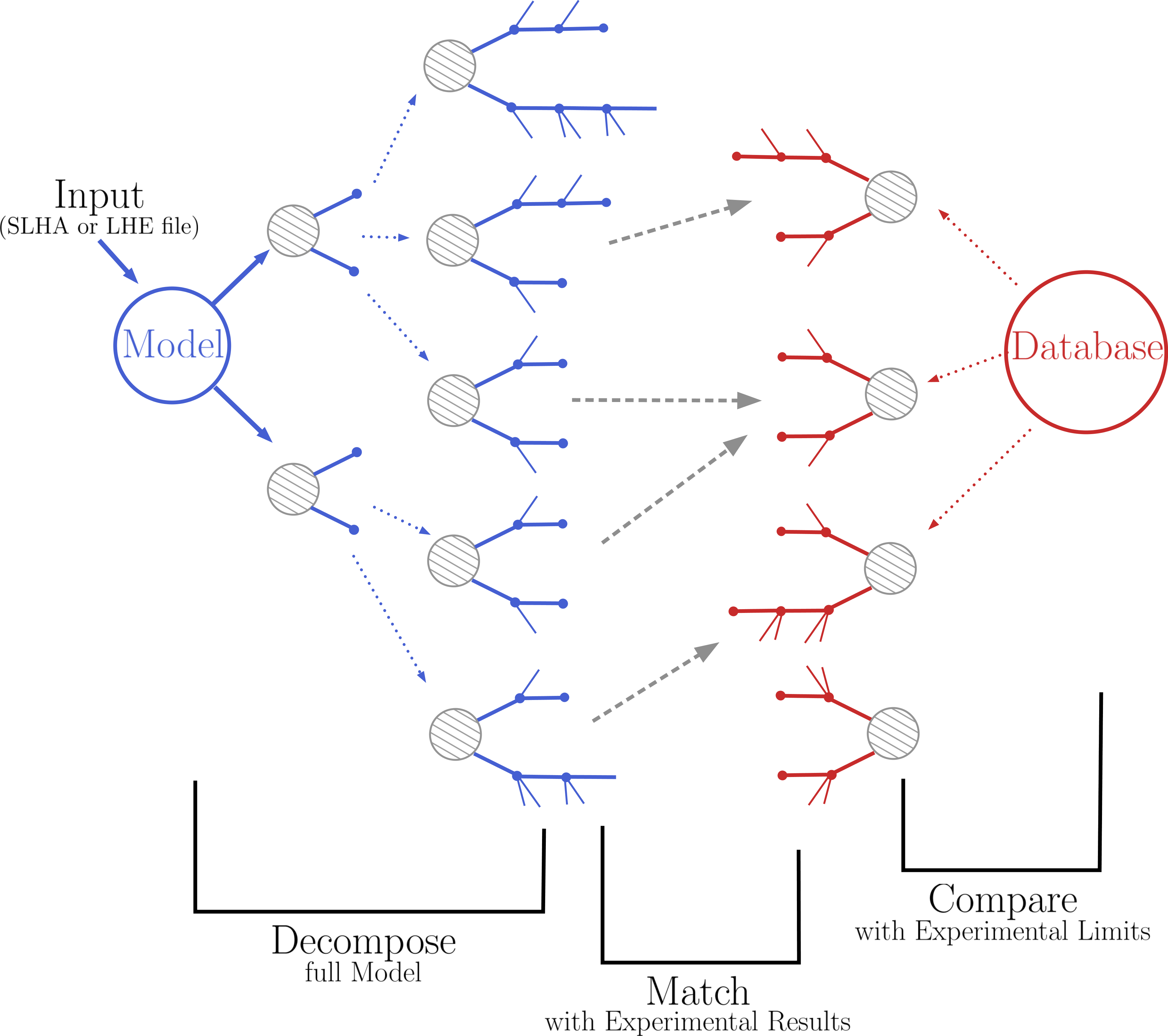Mohammad Mahdi Altakach, Sabine Kraml, Andre Lessa, Sahana Narasimha, Timothée Pascal, Camila Ramos, Humberto Reyes-González, Théo Reymermier, Yoxara Villamizar, Wolfgang Waltenberger
Previously involved in SModelS: Gaël Alguero, Federico Ambrogi, Jan Heisig, Charanjit K. Khosa, Juhi Dutta, Suchita Kulkarni, Ursula Laa, Veronika Magerl, Wolfgang Magerl, Philipp Neuhuber, Doris Proschofsky, Jory Sonneveld, Michael Traub, Matthias Wolf, Alicia Wongel
31 Oct 2024: SModelS version 3.0.1 available (what's new)
- Small fixes in the printer and the clustering -- numerical results may vary very slightly with respect to 3.0.0!
- Pyhf backend now configurable
- Quick start: Installation instructions
20 Aug 2024: SModelS version 3.0.0 available (what's new)
- Paper for version 3.0: arXiv:2409.12942
- New graph-based topology description now allows SModelS to handle arbitrary simplified model topologies, without the need of an imposed Z2 symmetry.
- Important database update with several non-Z2 signatures (resonances, monojet, RPV)
- A detailed documentation is available in the online manual
- For instructions on how to install SModelS, check the installation section in the manual.
- This tutorial is available from the latest Reinterpetation workshop.
- You may also want to check the release notes, the database releases and known issues
- Here are the list of analyses in the latest database version, the respective validation plots and an SMS dictionary explaining the Tx names used by SModelS.
- A discussion of re-interpretation methods and tools, and recommendations about the presentation of results can be found in this report by the LHC Reinterpretation Forum, arXiv:2003.07868.
- SModelS support for pyhf likelihoods is described in arXiv:2009.01809 and the main novelties of SModelS v2 in arXiv:2112.00769.
- An update of the micrOMEGAs interface for SModelS v2.2 is available on Zenodo
- For questions and comments, send an e-mail to: [email protected].
- To receive updates and announcements, subscribe to smodels-info.
- SModelS v2.3: enabling global likelihood analyses, Mohammad Mahdi Altakach, Sabine Kraml, Andre Lessa, Sahana Narasimha, Timothée Pascal, Wolfgang Waltenberger, arXiv:2306.17676
- Constraining new physics with SModelS version 2, Gael Alguero, Jan Heisig, Charanjit Khosa, Sabine Kraml, Suchita Kulkarni, Andre Lessa, Humberto Reyes-Gonzalez, Wolfgang Waltenberger, Alicia Wongel, arXiv:2112.00769
- A SModelS interface for pyhf likelihoods, Gael Alguero, Sabine Kraml, Wolfgang Waltenberger, arXiv:2009.01809, CPC March 2021, 107909
- SModelS database update v1.2.3, Charanjit K. Khosa, Sabine Kraml, Andre Lessa, Philipp Neuhuber, Wolfgang Waltenberger, arXiv:2005.00555, LHEP 158 2020
- SModelS v1.2: long-lived particles, combination of signal regions, and other novelties, Federico Ambrogi et al., arXiv:1811.10624, CPC 251, June 2020, 106848
- Constraining new physics with searches for long-lived particles: Implementation into SModelS, Jan Heisig, Sabine Kraml, Andre Lessa, arXiv:1808.05229, Phys.Lett. B788 (2019) 87-95.
- SModelS extension with the CMS supersymmetry search results from Run 2, Juhi Dutta, Sabine Kraml, Andre Lessa, Wolfgang Waltenberger, arXiv:1803.02204, LHEP 1 (2018) no.1,5-12
- SModelS v1.1 user manual: improving simplified model constraints with efficiency maps, Federico Ambrogi, Sabine Kraml, Suchita Kulkarni, Ursula Laa, Andre Lessa, Veronika Magerl, Jory Sonneveld, Michael Traub, Wolfgang Waltenberger arXiv:1701.06586, CPC 227 (2018) 72-98
- SModelS: a tool for interpreting simplified-model results from the LHC and its application to supersymmetry, Sabine Kraml, Suchita Kulkarni, Ursula Laa, Andre Lessa, Wolfgang Magerl, Doris Proschofsky, Wolfgang Waltenberger, arXiv:1312.4175, EPJC (2014) 74:2868
Moreover
- If you use the cross section calculator please cite Pythia and NLLfast
- If you use the Fastlim results in the database, please cite Fastlim 1.0 arXiv:1402.40492v1, EPJC74 (2014) 11.
For convenience a references.bib file containing all relevant references is provided with the code. Likewise, a database.bib file with references to all the ATLAS and CMS analyses used is provided in the text database.
SModelS is based on a general procedure to decompose Beyond the Standard Model (BSM) collider signatures presenting a Z2 symmetry into Simplified Model Spectrum (SMS) topologies. Our method provides a way to cast BSM predictions for the LHC in a model independent framework, which can be directly confronted with the relevant experimental constraints. The main SModelS ingredients are
- the decomposition of the BSM spectrum into SMS topologies
- a database of experimental SMS results
- the interface between decomposition and results database to compute limits
- For code and database releases, see Download
- Here is the list of analyses contained in the latest database version
- Same as above but including superseded analyses
- Pretty validation plots for all analyses
- We also provide an SMS dictionary explaining the Tx names used by SModelS
See the publications and talks page







